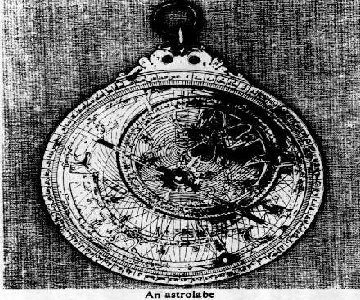| |
|
| |
|
|
| |
Among the
Arabs who laid the foundations for modern
astronomy were Battani (858-929) and
Biruni (973-1048). Battani's astronomical
tables were not only adopted
enthusiastically by the West, but were in
use there until the Renaissance. He was
the first to replace the Greek chord by
the sine, in trigonometry. His
works were translated and published in
Europe from the twelfth until the
mid-sixteenth century.
Professor Sarton considers Biruni
"One of the very greatest scientists
of all time." It was he who gave,
finally, an accurate determination of
latitude and longitude, and who, six
hundred years before Galileo, discussed
the possibility of the earth's rotation
around its own axis. He also investigated
the relative speeds of sound and light.
However much astronomy depends upon
mathematics, equally vital to it are
instruments, and in that field, also, the
Arabs proved themselves the chief
pioneers. In the early Middle Ages,
measurements had to be made with purely
mechanical instruments, such as the
quadrant, the sextant, or the astrolabe.
To reduce the margin of error, the Arabs
made their instruments larger than any
known before and, consequently, obtained
remarkably accurate results. The most
famous observatory at which these
instruments were being used was at
Maragha, in the thirteenth century, where
distinguished astronomers from many
countries collabo- |
|
| |
|
|
|
|
| |
|
|
| |
rated-not
only Muslim, Christian and Jew, but even
Chinese. It was the latter who were
responsible for the otherwise surprising
appearance of Arab trigonometry in China.
It has already
been indicated that, in the hands of the
Arabs, mathematics acquired a new
"dynamic" quality. We find this
in Biruni's trigonometry, where numbers
became elements of function, and in
Khawarazmi's algebra, where the algebraic
symbols contain within themselves
potentialities for the infinite. What is
significant about this development is
that it reveals an intuitive
correspondence between mathematics and
religion. The Qur'an does not
present the universe as finally created
or as a finished "article."
Rather, God keeps re-creating it at every
moment of existence. In other words,
creation is an ever-living process, and
the world is not static but dynamic. This
dynamic character, inherent in Islam, is
amply manifested in Arab mathematics.
In conclusion, it is clear that Arab
mathematicians, besides passing on to the
West the Hindu and Greek legacies, have
developed most branches of trigonometry
and astronomy, have given us algebra,
have invented many astronomical
instruments, and have shown that science,
instead of being a denial of faith, can
be its instrument if not its affirmation.
|
|
| |
|
|
|
|


